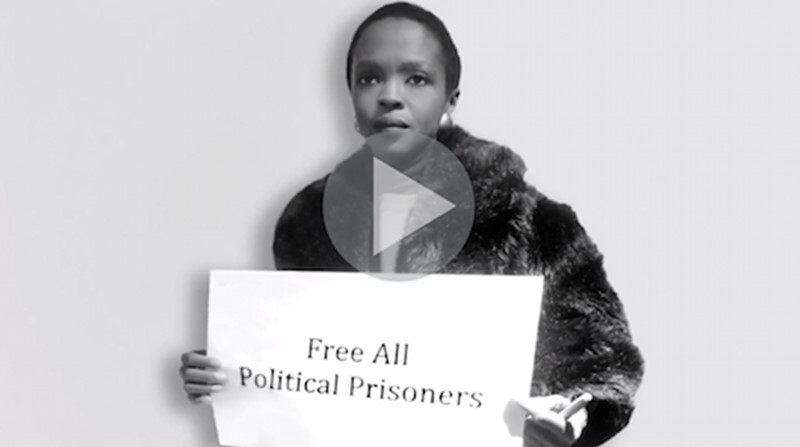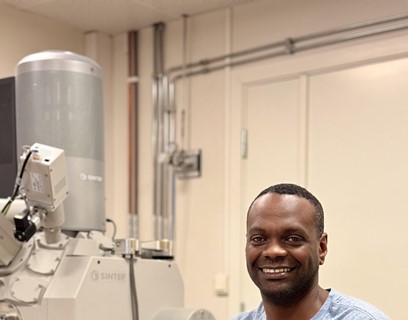
More than 60 leading Black and Palestinian artists and activists are featured in a new video highlighting challenges that both communities are confronting, including militarized policing and the prison industry. The video features Ms. Lauryn Hill, Danny Glover, Cornel West, Angela Davis, Alice Walker, Sapphire, LisaGay Hamilton, the Baha Men, Dream Defenders Co-Founder Ahmad Abuznaid, Yousef Erakat (fouseyTUBE), and others holding up signs such as “Gaza Stands With Ferguson” and “They choked me on video. I said I couldn’t breathe,” referencing the murder of Eric Garner in July 2014. It comes on the heels of an Aug. 19 statement signed by more than 1,100 Black activists, artists, scholars, students and organizations that calls for “solidarity with the Palestinian struggle” as well as a boycott of private prison company G4S and other corporations profiting from Israeli occupation.
“Mutual expressions of solidarity have helped to generate a vigorous political kinship linking black organizers, scholars, cultural workers and political prisoners in the U.S. with Palestinian activists, academics, political prisoners, and artists,” explained Angela Davis, renowned scholar, activist, and political prisoner who has visited Palestine and is featured in the video. “Palestinians have spoken out passionately against racist police violence in Ferguson and Baltimore as black people have vehemently stood up in defense of Rasmeah Odeh. That the Palestinian people have refused to surrender after almost seven decades of continuous struggle against Israeli settler colonialism is a great encouragement to black people in the U.S. to accelerate our ongoing struggles against racist state violence. These powerful images represent a journey from struggle against tyranny to a collective hope for a just future.”
The idea for the video came to Palestinian scholar and organizer Noura Erakat in the summer of 2014 while bombs were dropping on Gaza at the same time that the Ferguson uprising was sparked by the murder of 18-year-old Michael Brown.
“Palestinians used social media to share their advice on how to deal with tear gas and rubber bullets, and protesters chanted ‘From Ferguson to Gaza, we will be free,’” explained Erakat. “Organically, an analysis emerged highlighting similarities, but not sameness, of Black and Palestinian life, and more aptly, of their survival. Palestinians do not expect Black solidarity, but appreciate it tremendously. Our communities are dehumanized using similar logics of racism and repression. It behooves us to explore those similarities further and recognize that our exceptional conditions are the norm.”
“This is not just intellectual or symbolic solidarity,” said Kristian Davis-Bailey, a Black activist and Stanford graduate who co-wrote the script and co-organized the Black Solidarity With Palestinestatement. “We are working on the ground together as evidenced by our common campaignagainst G4S, a company that provides technologies for ever-growing prisons in the United States and Palestine.” In June, Columbia University became the first U.S. university to divest from prisons, and the Bill & Melinda Gates Foundation, United Methodist Church, and United Church of Christ have also dumped G4S stock over the past 16 months following pressure from Black and Palestinian human rights activists.
Remi Kanazi, a Palestinian poet and author of Before The Next Bomb Drops: Rising Up From Brooklyn to Palestine who co-wrote and co-narrated the script said, “It’s essential that in the same breath that we say ‘end Israeli occupation,’ we say ‘end mass incarceration,’ with the same force that we say ‘not one more bomb dropped on Gaza,’ we say ‘not one more bullet fired at Black people in Chicago,’ and with the same vigor that we say, ‘boycott, divestment, and sanctions,’ we say ‘divest from prisons.’”
“‘When I see them, I see us,’” has been an important theme for the legacy of Black-Palestinian solidarity,” explained Mari Morales-Williams, a Black scholar and youth organizer based in Philadelphia who co-wrote the script. “This line in the script recognizes the shared state agenda to demonize, police and annihilate Black and Brown bodies for its own imperialistic desires. It is also an invitation to create our own counter-narrative and to recommit to seeing the humanity and divinity within each of our resilient communities."
Video credits
Producer: Noura Erakat
Script writers: Kristian Davis Bailey, Remi Kanazi, Mari Morales-Williams
Narrators: Umi Selah, Dina Omar, Samantha Masters, and Remi Kanazi
Sponsoring Organizations: Dream Defenders, Black Youth Project 100, DC Palestinian Film and Arts Festival, Arab Studies Institute - Quilting Point Productions, and Jewish Voice for Peace. Produced with assistance from the Institute for Middle East Understanding.


